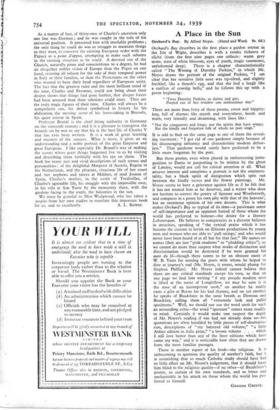_ A Place in the Sun
Orchard's Bay. By Alfred Noyes. (Sheed and Ward. 8s. 6d.)
Orchard's Bay describes in the first place a garden retreat in the Isle of Wight, describes it with a tender richness of cliché (from the first nine pages one collects: warm grey stone, stars of white blossom, eyes of youth, magic casements, unfathomed deep). There is a chapter characteristically called " The Wooing of Dorothy Perkins," in which Mr. Noyes draws the portrait of the original Perkins, " I am clear that her sensitive little nose was tip-tilted, and slightly freckled, like a thrush's egg, and that she had a laugh like a carillon of cowslip bells," and he follows this up with a poem beginning :
" 'Twas Dorothy Perkins, so dainty and gay,
Peeped out of her. window one midsummer day."
There are more than forty of these poems, sweet and hippity- hop, full of rhymes like myrrh and everywhere, booth and truth, very friendly and disarming, with lines like :
"Not the conquerors and kings; not the spirits that have wings; But the kindly and forgotten folk of whom no poet sings."
It is odd to find on the lame page as one of them the reveal- ing statement: " I got rid of one gardener simply because of his discouraging influence and characteristic modem defeat- ism." That gardener would surely have preferred to be a little more forgotten by the poet.
But these poems, even when placed in embarrassing juxta- position to Dante or purporting to be written by the ghost of Landor, would not call for critical attention at all. What arouses interest and completes a portrait is not the sentimen- tality, but a black spirit of denigration which spits out between the kindly verses and the flower paintings. Mr. Noyes seems to have a grievance against life as if he felt that it has not treated him as he deserves, and a writer who does not hesitate to correct the poetry of Spenser and Wordsworth, and compares in a poem his own pity with that of the heavens', has an enormous opinion of his own deserts. This is what makes Orchard's Bay so typical of its time—a' passionate sense of self-importance and an apparent hatred of those whom the world has preferred to honour—the desire for a literary Lebensraum. He believes in conspiracies as a dictator believes in atrocities, speaking of " the cynical praise which it has become the custom to lavish on illiterate productions by young men and women who are able to pull strings,' and who would never have been heard of at all but for that fact." He names no names (they are just "pink moderns" or "plodding critics"), so we cannot do more than suspect what works of distinction and discrimination would be destroyed if he were granted his auto da fe—though there seems to be an obscure sneer at W. B. Yeats for naming the poets with whom he hoped to dine at journey's end (Mr. Noyes, it seems, would plump for Stephen Phillips). Mr. Noyes indeed cannot believe that there are any critical standards except his own, so that on one page we find him writing " if any pseudo modern nose is lifted at the name of Longfellow, we may be sure it is the nose of an incompetent snob," on another he rashly casts a gibe at Byron for his bad rhymes, and on yet another he speaks of Baudelaire in the same breath as Dowson and Beardsley, calling them all " extremely lank and pallid specimens." Well, we should not use the word snob for such an astounding critic—the word "ignorant" comes more readily to mind. • Certainly it would make one suspect the depth of Mr. Noyes's reading if one had not already done so—his quotations are often heralded by little pieces of self-dramatisa- tion, descriptions of " my battered old volume," " a little Aldine edition in italic print," " a brown volume . . . which I still love better than any of the finer editions which have come my way," and it is noticeable how often they are drawn from the most familiar passages.
There is another aspect of his book—the religious. It is unbecoming to question the quality of another's faith, but it is astonishing that so much Catholic study should have had so little effect on Mr. Noyes's judgement, that it should leave him blind to the religious quality—if no other—of Baudelaire's poetry, so certain of his own standards, and so bitter and uncharitable in his attack on those whom the world has pre- ferred to himself.
GRAHAM GREENE.




































 Previous page
Previous page